Alumni Q&A with Mya Long: How the Emmy-winning documentarian found her dream job in public media
Nature documentarian and SRL alum Mya Long is proud to have combined her interests and found work that directly aligns with her values. She currently serves as a director, videographer, and editor at Idaho Public Television, and she credits her time with SRL as the start of her career. A three-time Emmy winner, Mya is driven to tell stories that educate the public and bring her closer to her community in the process.
Keep reading to learn how Mya found her dream job, moved to an unfamiliar area where she knew no one, and overcame the loneliness that comes with getting a fresh start.
This Q&A has been lightly edited for clarity.
How did you first come into contact with SRL?
My origin story with SRL started in 2015 when I was a junior in high school. Midway through high school, I had a media class with one of my favorite teachers and she was just really passionate about getting kids into journalism. In small-town Wisconsin she worked with SRL, and that was very special for me. I had my first nationally broadcast piece with SRL while I was still in high school. And then I went to the SRL Academy out in DC. That was a really good experience for me. SRL is the reason why I got into documentary and that’s still what I’m doing today.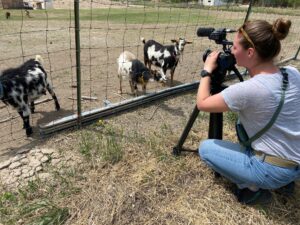
Before SRL I thought I was much more interested in fiction films. Then as soon as I got a taste of real journalism, I realized that I love telling real life stories.
What’s your favorite part of documentary film-making?
One of my favorite parts is getting to know people deeply and sharing their story. I really enjoy storytelling. That’s kind of my main love of documentary. And curating a story that is educational, entertaining, and digestible for other people to also learn about certain topics or individuals. Everyone has a story.
What’s the most important lesson you’ve learned from videography?
My copout answer is that there is always more to learn.
The biggest lesson is that there’s always more lessons. I’m like, “Yeah, I feel like I’ve done X, Y, and Z. Awesome. I feel like I’ve learned it all.” And then I go out on another shoot and I’m like, ” My god, there’s ABC on top of XYZ.” There’s always more lessons to be learned.
What do you enjoy about nature documentaries specifically?
I’m a big outdoors person. So, this was a dream job in the sense of being able to make documentaries and also be outside. I am so fortunate that I get to go out for many days at a time and I get to go camping and film outdoors. I get to climb 200 foot trees and go backpacking with all my camera gear, and I get to be in the middle of nowhere in Idaho and work.
And that’s my favorite part of this job – the fact that I’m making documentaries is really great, but selfishly I love that I get to be an outdoors person and explore the woods with someone that I really love to work with. That’s really lovely.
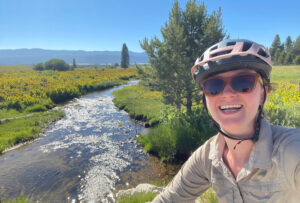 How did your career path take you to Idaho?
How did your career path take you to Idaho?
I went to Tucson, Arizona for about six years for college and I stayed for a job. Idaho was completely new to me. When I was applying for jobs, I had a pretty high bar, and I told myself that I wanted to live somewhere I’d never choose. And this was a dream job number one, but also it was in a place I knew nothing about: Boise, Idaho. I had no one there. I had one friend of a friend.
Exploring Idaho has been phenomenal. It’s so gorgeous. It can be so remote and it’s just been a good experience getting to know another part of the US. It was pretty great to realize six months into having this job, I had been to many parts of Idaho that a lot of locals have not been to, just random tiny towns in the middle of nowhere, a random pocket of national forest land. I get the opportunity to explore this state extensively for sure.
Can you speak to the challenges and the rewards of moving to a place where you don’t know anyone and are starting fresh?
I really value community and connections to people, so uprooting and moving to a place where I knew no one was pretty intimidating. It took probably a year and a half to feel comfortable socially. It can be a lonely existence. But I worked really hard and now that I’m two-and-a-half years in, I feel really happy with my community and I’ve found really good pockets of people in Boise and in Idaho in general. It’s a big challenge to go somewhere you don’t know without knowing anything about the area. I had only passed through Boise once.
And I will say luckily I had my dream job. So I poured a lot of my time and energy into exploring the state and making documentaries and that was very fulfilling for me. I’m glad that I had something to focus on when I didn’t have the community.
I highly recommend moves like this. I’m someone that likes a lot of challenge, and it gives you some wisdom. It’s really difficult, but it feels really beautiful to create your own community. You will find people, and once you do it feels very satisfying that you built it yourself.
A favorite project of yours?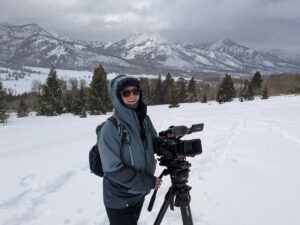
My favorite project with Outdoor Idaho has been an episode of our show called Return of the Giants. It’s about the western white pine, which is Idaho’s state tree. It was a very fulfilling project because I really enjoy ecology and the science of outdoors. I got to talk to a lot of scientists and kind of become an expert on western white pine. And then I also got to train and climb a 180-foot western white pine to do an interview.
What’s a documentary that you’ve seen recently and recommended?
I’m a big fan of the observatory style of documentary where the filmmaker very much lets it play out as naturally as possible. I just watched the Oscar nominated short documentaries and those were so good. Instruments of a Beating Heart is great because the film conveys emotion even with masks on, and it’s a whole story without a single interview. As an editor and as a filmmaker that’s a skill. I just thought it was incredibly well done. You almost want to cry with these kids just because they didn’t get their part in the band.
Why is public media important to you?
It’s so important to me and I feel so grateful that I’ve had such a history with it. I grew up with PBS Kids, and then as early as high school I was involved with SRL, and then in college and after college I was at Arizona Public Media, and now I’m at Idaho Public Television. So, I have deep roots in public media.
Having free access to neutral educational content is so important, especially now, and for me as a filmmaker being a part of it… I just feel really proud to work for PBS. I feel really proud to be able to be confident that I’m creating educational documentaries for the people of Idaho, and just serving the people.
PBS is trusted and it feels so good to be a part of something that has a reputation of just being educational and for the people. We’re not trying to get out any agenda. We’re not trying to necessarily make you feel a certain way. There’s nothing to sell. We don’t have ads.
How do you clear your mind when you’re feeling stuck or need a break?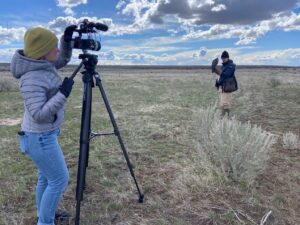
I typically just take a walk. Mental health breaks are big for me. If I’m in the office or even working from home and I need a creative burst, I’ll go for a little bike ride. I’ll go for a walk around the neighborhood or I’ll sit and do a breathing exercise. So just taking my mind off of things is typically a great way to reconnect with my work.
Or watching other content. I find a lot of value in watching other documentaries. It brings me a lot of inspiration.
What’s some advice that you would give to a student who wants to do something similar, wants to either work in public media or get into documentary film making? How would you suggest that they get started?
I would suggest getting involved with projects that are interesting to you. So for me, I got myself into outdoor projects. I started with editing teases for nature documentaries and just getting my foot in the door that way, just starting with my passion and what brought me a lot of joy, and then keeping the connections I made. This career is all about networking, communicating, and showing your worth.
It’s a lot of consistently showing up, and it helps if it’s for something that you’re really passionate about.
